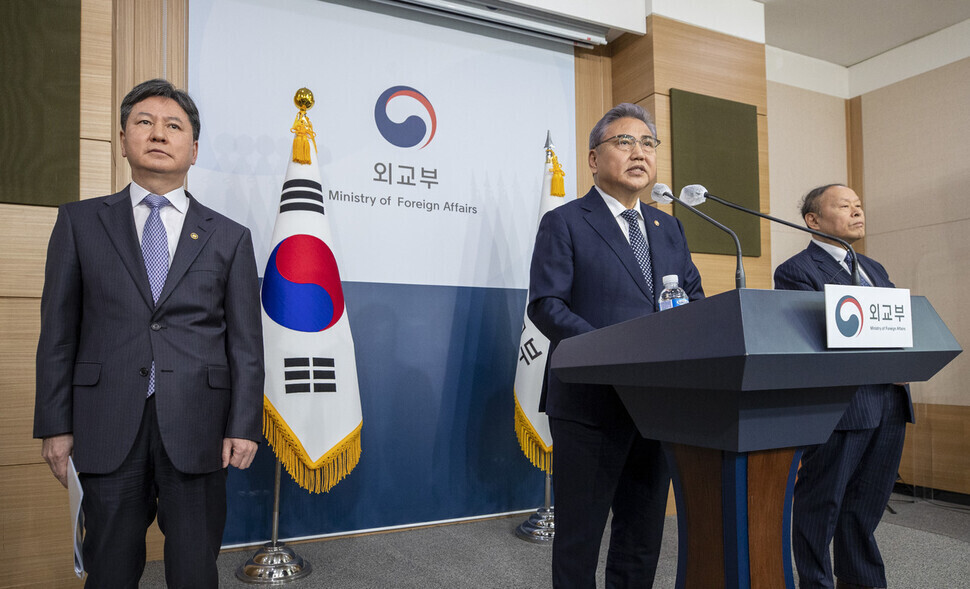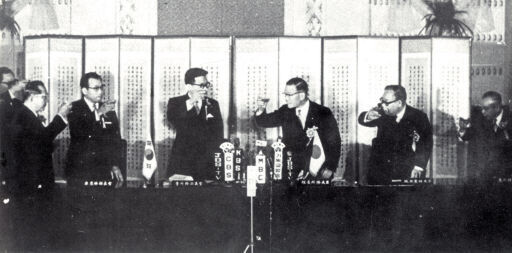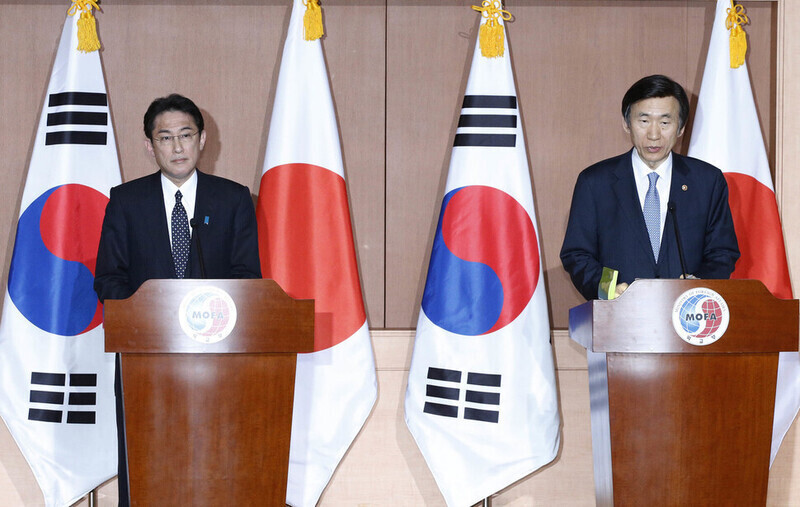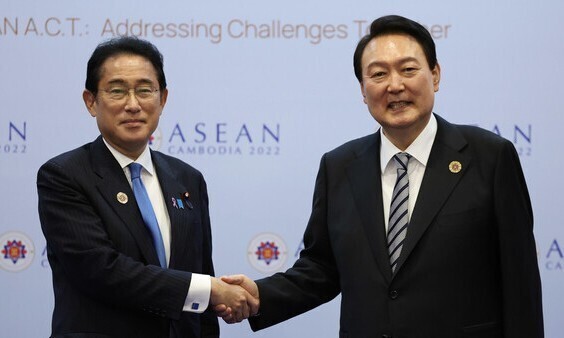hankyoreh
Links to other country sites 다른 나라 사이트 링크
[News analysis] In raising white flag to Japan, Yoon tramples 30-year fight for Korea’s forced laborers

For the four-and-a-half years since a South Korean Supreme Court ruling in October 2018, South Korea and Japan had been at odds over the issue of compensating victims of forced labor mobilization during the occupation. On Monday, that matter was concluded with a unilateral surrender by the Yoon Suk-yeol administration.
The situation threatens to spell major disaster for the postwar battle for compensation, as South Korea’s civil society has fought fiercely to get Japan to acknowledge the illegal nature of its colonial occupation and to give a legitimate apology and compensation.
Together with the South Korea-Japan claims settlement agreement of 1965 and the intergovernmental agreement on the military sexual slavery issue in late 2015, it can be seen as one of three “seals” that have dashed South Koreans’ hopes of a just resolution to the two sides’ historical conflicts.

In the process of reestablishing diplomatic ties with Japan in the post-liberation era, the Republic of Korea spent 13 years and eight months in desperate negotiations to get Japan to admit the illegal nature of its colonization of the peninsula. The results of that were reflected in Article 2 of their Treaty on Basic Relations, which was officially signed in Tokyo on June 22, 1965.
In it, the two sides reached a conclusion in which they “confirmed that all treaties or agreements concluded between the Empire of Japan and the Empire of Korea on or before August 22, 1910 are already null and void.” The Treaty of Annexation was signed on Aug. 22, 1910, and the Eulsa Treaty was concluded in 1905.
This seemingly unassuming sentence is what has sustained a balance amid fraught tensions. South Korea interpreted the part about past treaties being “confirmed null and void” as meaning that the Annexation Treaty itself was illegal and invalid. Japan has read the “already” to mean that the treaty was previously legal and valid, but that by 1965 it had been rendered invalid by Japan’s own surrender and the establishment of the Republic of Korea.
This was a desperate attempt to patch up what had been an unresolvable historical issue. In exchange South Korea received “claim” funds from Japan that amounted to US$300 million in grants and US$200 million in credit assistance — long-term, low-interest loans it used to lay the groundwork for the economic development that would become known as the “Miracle on the Han River.”

The second seal came about in December 2015. The formidable wall of the first seal ended up being broken down by the lonely cries of Kim Hak-soon (1924–1997), who in August 1991 became the first South Korean survivor of Japan’s system of military sexual slavery to come forward publicly.
After Kim stepped forward, it was increasingly seen as South Korea’s historical obligation to sympathize with the plight of the “comfort women” victims, to restore their dignity, and to make the Japanese government offer a proper apology.
But these efforts faced a towering barrier with the first of the seals, which declared the matter of claims between South Korea and Japan to have been “fully and finally resolved.”
In July 1995, the Japanese government created the Asian Women’s Fund, but it insisted to the last that it could not provide funding from the government budget, citing the terms of the 1965 agreement.
South Koreans, for their part, rejected the Asian Women’s Fund framework, as it acknowledged only Japan’s “moral responsibility” for the military sexual slavery issue without recognizing its nature as a crime by the state. After a difficult legal battle, South Korean civil society finally received a historical Constitutional Court decision in August 2011 stating that Seoul had acted unconstitutionally with its “omission” in not having negotiated with Tokyo.
From there, South Korea and Japan finally arrived at their intergovernmental agreement of Dec. 28, 2015, which came after four years of combative diplomatic negotiations. Then-Japanese Prime Minister Shinzo Abe went a step further than the past recognition of “moral responsibility,” stating that he was “painfully aware of” Japan’s responsibility, and the agreement included the contribution of 1 billion yen (US$9.23 million) in Japanese government money to a fund for the victims.
In exchange, South Korea had to accept the inclusion of wording describing the military sexual slavery issue as having been “resolved finally and irreversibly.” From South Korea’s standpoint, it was a deeply disappointing compromise, but it did at least achieve something. After the agreement was announced, Japanese right-wing figure Yoshiko Sakurai expressed how “enraged” she was with it.

Since taking office, the Yoon administration has focused its main diplomatic efforts on striking a minimal “balance of interests,” while disparaging a decision by the South Korean Supreme Court that came after a three decade-long battle by forced labor mobilization survivors.
Speaking about that ruling in a briefing on Monday, an official with the presidential office explained, “In terms of international law and in terms of the promise made between the South Korean and Japanese governments in 1965, Japan’s conclusion is that South Korea violated the agreement.”
This was a case of an official in South Korea’s presidential office using an official briefing as an occasion to defend Japan’s position, rather than upholding a South Korean Supreme Court decision.
As a result, the administration made the complacent and humiliating choice to dismiss the intent of the Supreme Court’s decision — over the objections of Ministry of Foreign Affairs staffers, who had hoped to see through the aim of getting the Japanese companies responsible to apologize and take part in the compensation effort, as a joint civilian-government commission had concluded in its activities between July and September 2022.
“This is a total victory for Japan,” a prominent lawmaker with Japan’s Liberal Democratic Party told the Sankei Shimbun newspaper on Tuesday. “We didn’t have to concede anything.”
Such was the outrageous outcome of the “third seal” chosen by the Yoon administration.
By Gil Yun-hyung, staff reporter
Please direct questions or comments to [english@hani.co.kr]

Editorial・opinion
![[Column] Season 2 of special prosecutor probe may be coming to Korea soon [Column] Season 2 of special prosecutor probe may be coming to Korea soon](https://flexible.img.hani.co.kr/flexible/normal/500/300/imgdb/original/2024/0426/3317141030699447.jpg) [Column] Season 2 of special prosecutor probe may be coming to Korea soon
[Column] Season 2 of special prosecutor probe may be coming to Korea soon![[Column] Park Geun-hye déjà vu in Yoon Suk-yeol [Column] Park Geun-hye déjà vu in Yoon Suk-yeol](https://flexible.img.hani.co.kr/flexible/normal/500/300/imgdb/original/2024/0424/651713945113788.jpg) [Column] Park Geun-hye déjà vu in Yoon Suk-yeol
[Column] Park Geun-hye déjà vu in Yoon Suk-yeol- [Editorial] New weight of N. Korea’s nuclear threats makes dialogue all the more urgent
- [Guest essay] The real reason Korea’s new right wants to dub Rhee a founding father
- [Column] ‘Choson’: Is it time we start referring to N. Korea in its own terms?
- [Editorial] Japan’s rewriting of history with Korea has gone too far
- [Column] The president’s questionable capacity for dialogue
- [Column] Are chaebol firms just pizza pies for families to divvy up as they please?
- [Column] Has Korea, too, crossed the Rubicon on China?
- [Correspondent’s column] In Japan’s alliance with US, echoes of its past alliances with UK
Most viewed articles
- 1Samsung subcontractor worker commits suicide from work stress
- 2‘We must say no’: Seoul defense chief on Korean, USFK involvement in hypothetical Taiwan crisis
- 3[Editorial] Korea’s surprise Q1 growth requires objective assessment, not blind fanfare
- 4Division commander ordered troops to enter raging flood waters before Marine died, survivor says
- 5Is Japan about to snatch control of Line messenger from Korea’s Naver?
- 6No good, very bad game for Korea puts it out of Olympics for first time since 1988
- 7US overtakes China as Korea’s top export market, prompting trade sanction jitters
- 8N. Korean delegation’s trip to Iran shows how Pyongyang is leveraging ties with Moscow
- 9Korea’s 1.3% growth in Q1 signals ‘textbook’ return to growth, says government
- 10[Column] Season 2 of special prosecutor probe may be coming to Korea soon